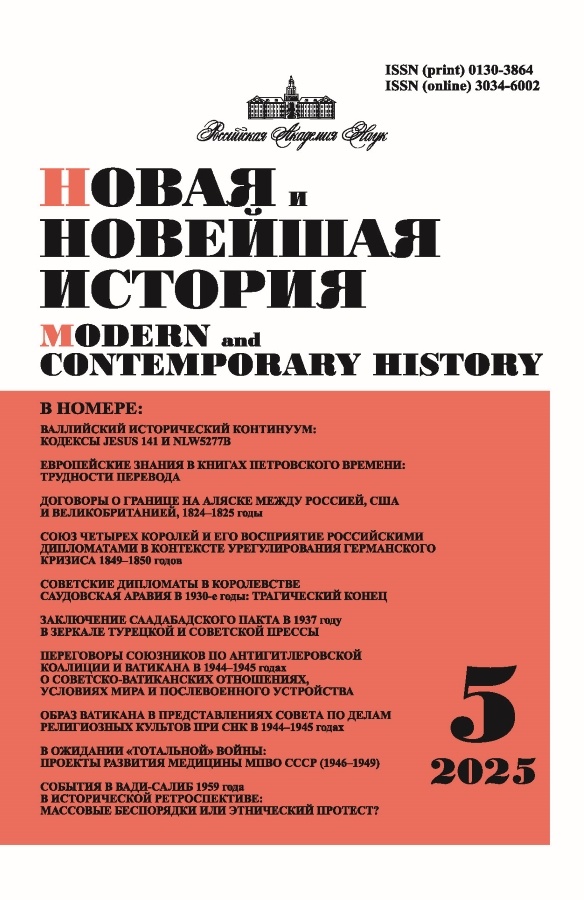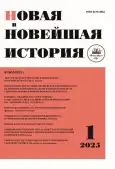Общественно-политическая роль ‘улама в противостоянии между королем Саудом Ибн Абд Аль-Азизом и наследным принцем Фейсалом (1958–1964)
- Авторы: Фролов К.Д.1
-
Учреждения:
- Институт востоковедения РАН
- Выпуск: № 1 (2025)
- Страницы: 203-213
- Раздел: XX век
- URL: https://gynecology.orscience.ru/0130-3864/article/view/679451
- DOI: https://doi.org/10.31857/S0130386425010163
- ID: 679451
Цитировать
Полный текст
Аннотация
Статья посвящена анализу участия саудовского духовенства (‘улама) в развернувшейся в 1958–1964 гг. борьбе за престол между королем Саудом ибн Абд аль-Азизом и наследным принцем Фейсалом, а также анализу структуры богословского корпуса и его роли в обществе. Отечественные исследователи проявили ограниченный интерес к данной теме, в то время как зарубежные авторы расходятся во мнениях относительно влияния ‘улама в событиях 1958–1964 гг. Целью статьи является выяснение роли саудовского духовенства в исход борьбы за власть. Внутренняя обстановка в Королевстве Саудовская Аравия (КСА) в середине XX в. была острой из-за кризиса кочевого хозяйства, безработицы, аграрного перенаселения, инфляции, непомерных расходов правящей верхушки и коррупции. К 1958 г. стало очевидно, что политика короля Сауда грозила катастрофой. Против монарха выступил наследный принц Фейсал. В период с 1958 по 1964 г. Сауд потерял всех сторонников и в ноябре 1964 г. был вынужден отречься от престола в пользу Фейсала. Богословы являлись духовной элитой страны и обладали авторитетом среди оседлого населения. В борьбе за власть они поддержали принца Фейсала, оказывая давление на короля Сауда в идеологической сфере, активно критикуя введение элементов западной культуры, таких как телевидение, фото и др. Так же они поддержали ультиматумы сторонников Фейсала королю в 1962 и 1964 гг., санкционировали отречение Сауда и восшествие на престол Фейсала в ноябре 1964 г. Автор приходит к выводу, что роль богословов была существенной, однако для полной победы требовалась поддержка кочевников, так как саудовское общество было разделено на оседлых и кочевников, среди которых ‘улама не пользовались авторитетом, что позволяет считать вклад обеих групп равнозначным.
Ключевые слова
Полный текст
Об авторах
Кирилл Дмитриевич Фролов
Институт востоковедения РАН
Автор, ответственный за переписку.
Email: k_frolov98@mail.ru
ResearcherId: ADY-7792-202
аспирант центра арабских и исламских исследований
Россия, МоскваСписок литературы
- Адамов А. Ирак Арабский. Бассорийский вилайет в его прошлом и настоящем. СПб., 1912.
- Васильев А.М. История Саудовской Аравии (1745–1973). М., 1982.
- Васильев А.М. Король Фейсал. Личность, эпоха, вера. М., 2010.
- Георгиев А.Г., Озолинг В.В. Нефтяные монархии Аравии. Проблемы развития. М., 1983.
- Де Лонг-Ба Н.Дж. Реформы Мухаммада ибн Абд аль-Ваххаба и всемирный джихад. М., 2010.
- Озолинг В.В. Саудовская Аравия. М., 1968.
- Озолинг В.В. Экономика Саудовской Аравии. М., 1975.
- Прошин Н.И. Саудовская Аравия. Историко-этнографический очерк. М., 1964.
- Родригес А.М. Нефть и эволюция социальных структур аравийских монархий. М., 1989.
- Яковлев А.И. Саудовская Аравия. Пути эволюции. М., 1999.
- Абдаллах А. Ал ‘улама валь-ирш сунаиййат ас-султа фи ас-саудийа [‘Улама и престол: двойственный характер власти в Саудовской Аравии]. Лондон, 1995 // URL: https://archive.org/details/20201111_20201111_1306/page/n3/mode/2up (дата обращения: 23.03.2023). (На араб. яз.)
- Аль Бассам А. ‘Улама наджд хилала саманийат курун [‘Улама Неджда на протяжении восьми веков]. Т. I–III. Ар-Рияд, 1998. (На араб. яз.)
- Аз-Зирикли Х. Шибх аль-джазират аль-арабийа фи ахд аль-малик Абд аль-Азиз [Аравийский полуостров в правление короля Абд аль-Азиза]. Бейрут, 1992. (На араб. яз.)
- Хамза Ф. Аль-билад аль-арабийа ас-саудийа [Саудовская Аравия]. Макка, 1937. (На араб. яз.)
- Al-Atawneh M. Wahhabi Islam facing the Challenges of Modernity. Dar al ifta in the Modern Saudi State. Leiden; Boston, 2010.
- al-Rihani A. Ibn Saud of Arabia. New York, 1928.
- Bligh A. The Saudi religious elite (the ulama) as participant in the political system of the kingdom // International Journal of Middle East studies. 1985. № 1. P. 37–50.
- Burckhardt J.L. Notes on the Bedouins and the Wahhabys. Vol. I–II. London, 1831.
- De Gauri G. Faysal king of Saudi Arabia. New York; Washington, 1966.
- Dickson H.R.P. The Arab of the Desert. London, 1959.
- Kostiner J. The Making of Saudi Arabia (1916–1936). From Chieftaincy to Monarchial State. New York; Oxford, 1993.
- Laysh A. Ulama and politics in Saudi Arabia // Islam and politics in the Modern Middle East / eds M. Heper, R. Israeli. London; Sydney, 1984. P. 29–63.
- Mouline N. The Clerics of Islam. Religious Authority and Political Power in Saudi Arabia. London, 2014.
- Middle East Records. Vol. 1. London, 1960.
- Philby H. St-J. B. Forty years in the Wilderness. London, 1957.
- Vogel F. Islamic law and legal system. Studies of Saudi Arabia. Leiden; Boston; Köln, 2000.
Дополнительные файлы








